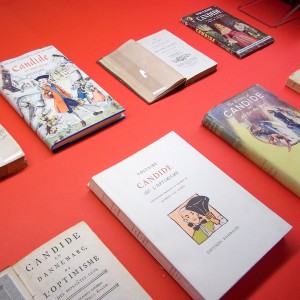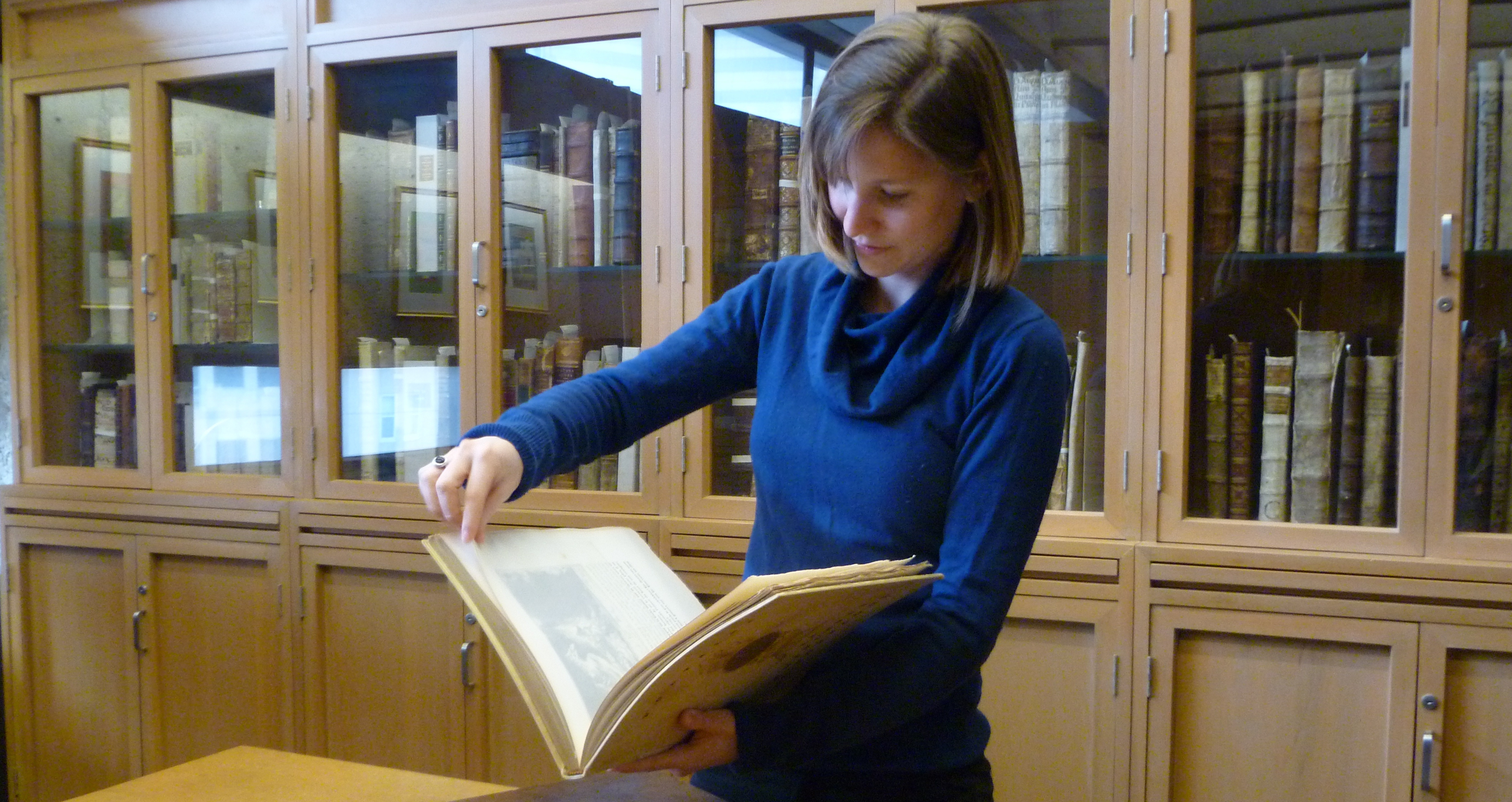From February 3rd to May 2nd, McGill’s Rare Books & Special Collections (RBSC) welcomes Élise Breton, a student from l’École nationale supérieure des sciences de l’information et des bibliothèques (Enssib) in Lyons, France. Communications Officer Merika Ramundo sat down with Élise to talk about her experience.
Merika Ramundo (MR): Tell us a little about your background.
Élise Breton (EB): I am from Blois in central France. I have a masters degree in law and administration of cultural establishments from Institut d’études politiques de Bordeaux and I am currently studying librarianship at Enssib in Lyons. The system there is a bit different compared to here. Here you need a masters degree in library information studies to work in libraries. In France, public examinations are the most common form of hiring librarians. If you want to work in libraries you must take a state exam. Limited positions are offered. If you succeed, you are assured a position in a library Before being assigned a job, you receive training in librarianship but since you get paid in that capacity, you are not really a student any more – you are a kind of “student – civil servant”. Part of this training aspect is an internship that you can do in France or abroad. I have to take three internships in total but this one at McGill is the longest, most important one. In May, I will be interviewing for jobs in France. I am assured a position in a library that depends on the state like university libraries, special libraries, national libraries, etc.
MR: How did you decide to come to McGill? Was it something that you sought out?
EB: In January 2013, we had a presentation on Concordia’s Webster Library given by Guylaine Beaudry and I thought it was interesting so I became more and more fascinated about libraries in Canada. I thought I would rather apply to an anglophone library so I could learn professional vocabulary in English. Working at an English institution in a French milieu is great – you learn a lot – two cultures, two languages. It’s also a great opportunity to discover new and interesting ways of running a library.
MR: Your internship is in Rare Books & Special Collections. What have been working on?

Illustrated Candide covers from the recent exhibit entitled Voltaire: A Sampling from the J. Patrick Lee Collection. (Photo Credit: Merika Ramundo)
EB: My main focus is the J. Patrick Lee Voltaire Collection. I have to think about an online strategy for opening up the collection to the world. I have been looking at most of the collection to try to get a better understanding of it in order to identify what we could highlight because we cannot digitize the whole collection. The collection is very strong – there are so many interesting things about it. At the moment I am working on illustrated works, in particular illustrated covers of Candide. J. Patrick Lee, the previous owner of the collection, wrote an article about American editions of illustrated works. He wrote about the illustrators, their style of drawing and other aspects of the works. I think this is something we could definitely highlight on the website. I also identified some interesting works with dubious authorship in the collection, for example works written in imitation of Voltaire to cash in on his success and popularity. Candide Part II is one of these, most probably written by the abbé du Laurens but certainly not by Voltaire. However, it was for a very long time considered as the natural continuation of Candide and was even included in an American edition sold until 1956!
Apart from this main project, I also had the chance to attend a class – GLIS 644 Descriptive Bibliography – taught by Dr. Richard Virr, Head, Rare Books and Special Collections for the School of Information Studies. I didn’t know a lot about rare and special materials before coming here so it was a great learning experience for me.
I am also helping to identify, describe and organize the collection of late 19th and early 20th-century chromolithographs. Like many collections here at RBSC, this collection is varied and very surprising. I am learning important skills like how to be consistent in the description of material.
The RBSC staff have really welcomed me and I have learnt a lot from them! I was very surprised – in a good way – to see how rich the collection is. Hume, Rousseau and the other 18th century collections are amazing. It didn’t expect RBSC to have so many things and that collections here were so diverse.
MR: What do you want to specialize in when you head back to France?
EB: I am open to different opportunities. Before this experience more I was interested in digitization. I would not have thought about working in a rare books library but this has changed my perspective.
MR: Are there any clear differences or similarities between academic libraries here and those in France?
EB: I think I realized that Canadian and French libraries are all facing the same challenges like budget cuts and the collection of print and digital materials and the reality that we cannot afford to collect both of everything. University libraries here are one step ahead in the ways they try to satisfy patrons’ needs – like extended opening hours and special services. We are doing it in France too, but it is a slow process.
I visited the Bibliothèque et Archives nationales du Québec (BAnQ) and liked it very much but I have yet to visit French academic libraries and other libraries in Montreal. I would like to see a lot more before I leave in May.
MR: What do you think of Montreal?
EB: I love it. It is such a dynamic city, and very nice to live in too. It’s really funny because the whole day I am speaking English and I feel like I am in a foreign country but then I go to a café and order in French and it’s not so foreign after all. But I discovered a lot about Quebec culture and politics. I had the chance to witness the provincial campaign and election while I was here. Maybe the cultural shock was the weather.














Leave a Reply
You must be logged in to post a comment.